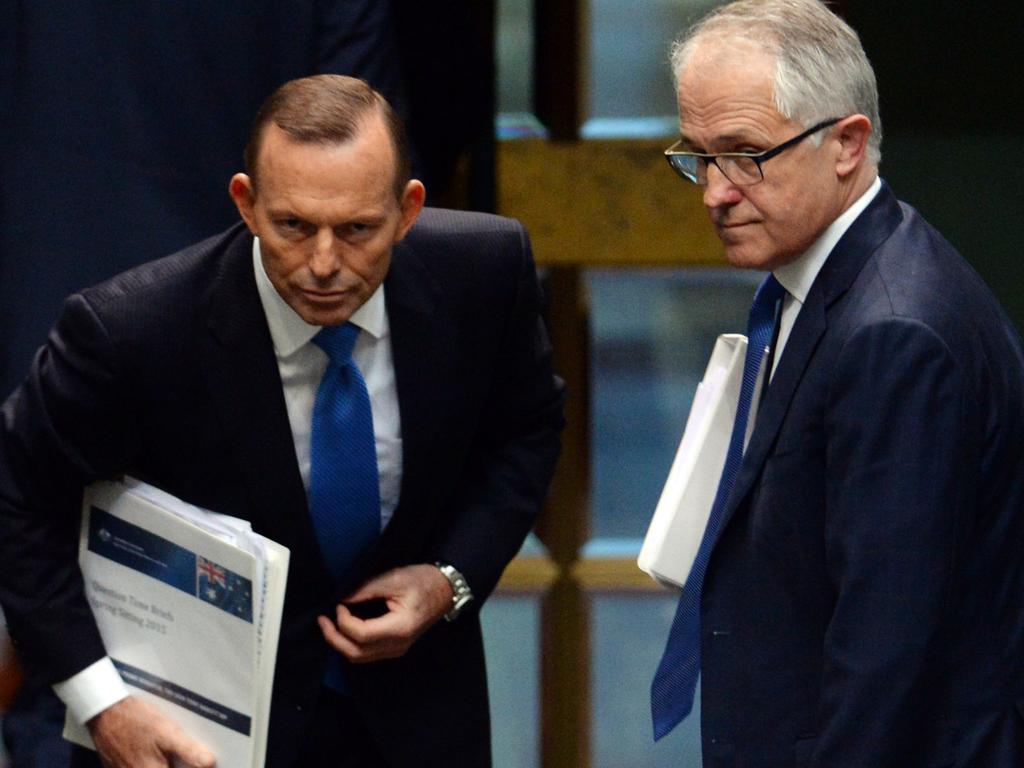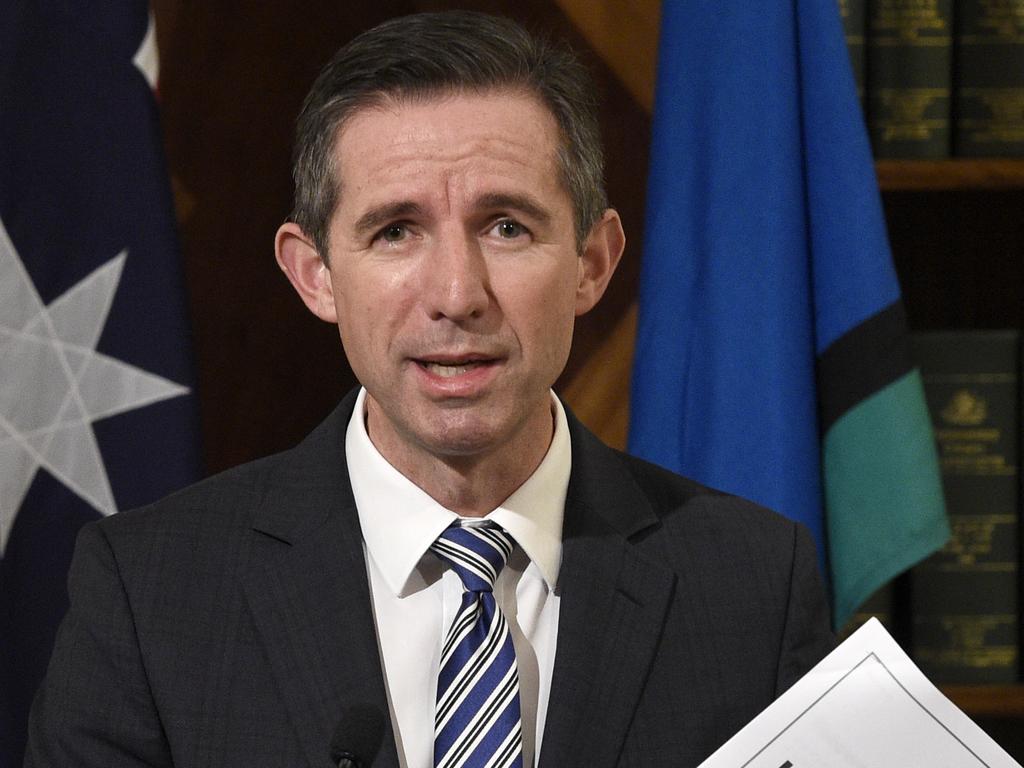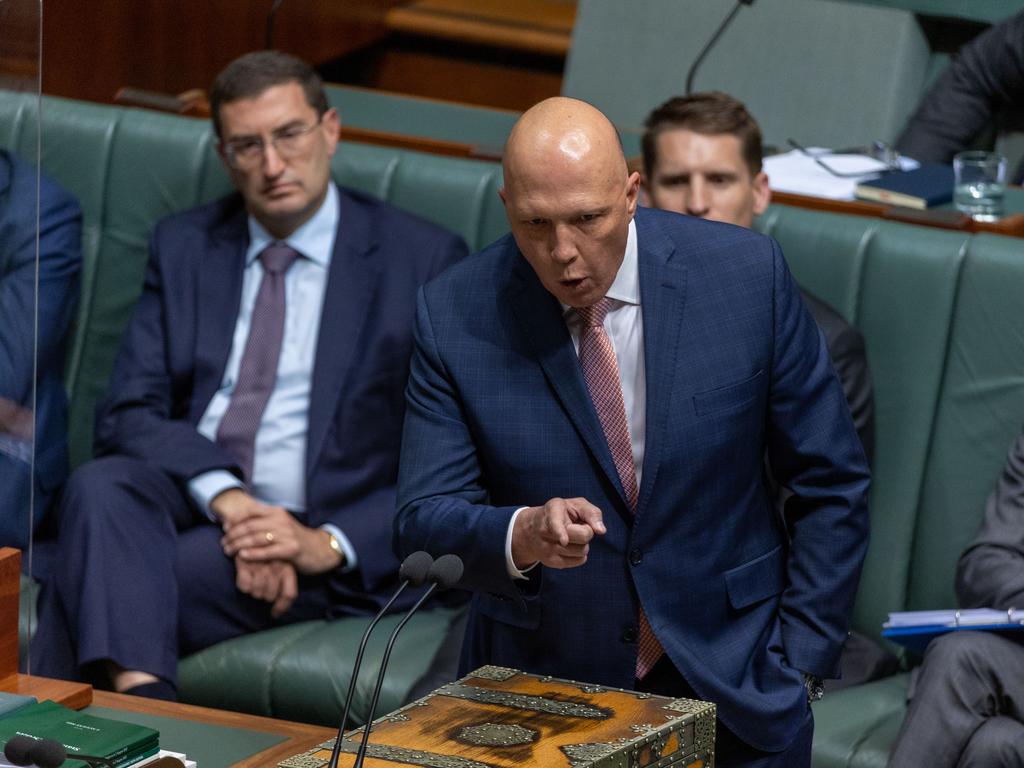ABC’s Nemesis exposed the Liberal-wrecking egos. This is why I refused to take part


Because it was TV about a government that cannibalised itself, the first episode largely ignored the good that was done in favour of dramatising the politics of personal destruction; and because it was the ABC, not a lot of Malcolm Turnbull’s observations were adequately challenged, at least in what went to air. Still, in getting many of the key plotters on the record, we can now see how a government that should have been as good as John Howard’s turned out to be more like Malcolm Fraser’s. Once Tony Abbott was gone, it was more Labor-lite than distinctively centre-right.
As someone who spent a year working for Turnbull as his deputy chief of staff when he was opposition leader, and then six years working as Abbott’s chief of staff when opposition leader and PM, I saw these rivals at close quarters, under pressure, on good days and bad. It didn’t surprise me that Turnbull reportedly spent something like eight hours on tape lashing out at others; aside from his shocking glass jaw, this was about justifying himself and getting the affirmation he’s always craved from the lefty Q+A crowd.

Likewise, it didn’t surprise me that Abbott declined to be involved because he never saw himself as the hero in a play that was all about him. Abbott took the view that he’d said all that needed to be said when in office and had adequately reflected on the strengths and weaknesses of his government in speeches he personally wrote, as well as in the three essays he penned for Quadrant, published in 2016.
Like me, he mistrusted the ABC’s own agenda. As it happened, the file footage that the ABC selected at least did justice to the focus and discipline required to bring the Coalition back to government in record time and didn’t entirely ignore the successes of the first two years, like stopping the boats (that no one thought could be done), finalising the trade deals that had languished for a decade, scrapping the carbon tax and mining tax, and beginning an infrastructure catch-up with new projects (such as WestConnex and the Western Sydney airport) that are even now still being opened.
As for Turnbull’s claim that Abbott was a “dangerous” prime minister who ran a “terrible” government, a minister with honour could always have resigned, if that were his view, rather than spend more time machinating against his leader than doing his job. Turnbull several times offered to use his friendship with fellow rich-lister Clive Palmer in support of the 2014 budget (the last attempt at significant economic reform) but like so much, those were empty words. And as he told the world on Monday night, by then he was in discussions with numerous colleagues, including Scott Morrison, he insisted, to remove the PM who’d won a majority akin to that of Fraser in 1975 and Howard in 1996.
Indeed, it was only because of Abbott’s landslide victory that Turnbull narrowly survived his one and only electoral test as leader when he sacrificed 14 of the 25 seats that Abbott had won from Labor over two elections. Turnbull’s claim that the PM was somehow both anti-women and overly dependent on his female CoS was utterly implausible. Claims that Abbott didn’t run a proper cabinet process are also fanciful; after all, Turnbull himself had appointed me secretary to the shadow cabinet when he was leader and Abbott’s problem was less how cabinet operated and more those who leaked from it.

Whatever the claims against me, at least I was working for the government, not against it.
On national security, far from being dangerous, “shirt-fronting” Putin was the least a self-respecting Australian leader could do after the Russian dictator’s 2014 mini-invasion of Ukraine led to the murder of 38 Australians on MH17. Abbott didn’t sit on his hands or hide behind bureaucrats. Yet all the Abbott government’s military deployments – to Ukraine to bring back our dead, to airdrop supplies to the besieged Yazidis on Mt Sinjar, to advise and assist and train the Iraqi armed forces against ISIS, to run weapons to the Kurds, and to bomb terrorist positions in Syria – were made with official military and intelligence advice and demonstrated that, at least in those days, Australia’s armed forces were more than capable of being deployed around the world in support of freedom.
It’s hardly surprising, given the nature of the program, that the ABC failed to put the record-straight on a couple of key issues. The 2014 budget did not break election promises. It was only subsequently that Abbott applied a modest efficiency dividend to the ABC that nearly all other agencies had long faced. Abbott had been explicit in the 2013 campaign that the Coalition would not support the Gillard cash splash on schools and hospitals beyond the then forward estimates. And history shows that total spending on health and education continued to increase (yes, increase) under Abbott; only at a slower (and more sustainable) rate than before. Abbott was just following the Hawke government precedent in seeking a modest co-payment on GP visits, and extending an earlier Labor move to raise the pension age, and to reduce the indexation rates for some social security benefits. Seeking to have school leavers learn or earn rather than go on the dole was a worthy bid to break the “something for nothing” mindset that’s so contrary to our old “have a go” Australian ethos.
Once same-sex marriage had been rejected by the parliament in the 2010 term (including by then PM Gillard who voted it down), Abbott’s position was that, if it came up again, the Coalition’s position would be decided in the usual way by the joint partyroom. There was nothing tricky or underhand in his handling of this issue. Indeed, he’d specifically discussed putting the issue to a plebiscite with a key frontbencher (who subsequently claimed to have been taken by surprise) at a dinner in Adelaide a few weeks earlier; I know because I was there. As Abbott said at the time, people’s attitude to marriage is so personal that it should be decided directly by them rather than by their MPs (as was Turnbull’s preference); that it would mean, whatever the outcome, that Australians would accept it without rancour. And he was right. Indeed, resolving this issue via the plebiscite that Turnbull had opposed turned out to be one of his government’s few achievements.

With time to reflect, it’s now clear that one of the key differences between our public life in the Hawke-Howard era, when I started in politics in 1998, and more recently has been the decline in personal character. Our best recent PMs were able to succeed because big egos with different policy positions were much readier to buckle down and support the government, and the leader of the day. Most of them saw public life in terms of service to the nation rather than personal advancement and didn’t let resentment get the better of them if they never went into cabinet or even past the backbench. On that score, looking at how Turnbull and others let their personal agendas trump the long-term national interest shows how central Peter Costello’s good character and forbearance were to the ultimate success of the Howard government. Perhaps the most dispiriting aspect of Nemesis’ first episode was the credibility it gave to a raft of MPs smarting at Abbott’s move to end family members’ employment at taxpayer expense or first class travel overseas.
After having a ringside seat at the self-destruction of the Rudd-Gillard government, I never thought that the Coalition would indulge in an action replay. I always knew Turnbull would try and come for Abbott one day but I didn’t think MPs would buy the carpetbagger’s spiel in the first term, especially after his patent failures as opposition leader. Such a waste, such a tragedy for our country, and such a blot on the record of the Liberal Party to the everlasting shame of those responsible.
Like Abbott, I declined to appear in the program; because I was certain of a selective and distorted version of my response to the usual crap that I was too tough on entitlements (what was the alternative, to lose ministers as in the first term of Howard?), that MPs couldn’t get to Abbott (really; they couldn’t use a mobile phone, walk around to his office, or buttonhole him after question time?), that voters didn’t want to see staffers in bars late at night (recent history? enough said) or that I spoke my mind (isn’t that what a good adviser does, not just meekly agree?)

‘Everything was used against me, even my years on IVF by low-lifes like Clive Palmer.’
It was commitment to the Liberal Party’s ideals that motivated me to serve our country as a political staffer for over 16 years; a faith – to be frank – that was severely shaken when Turnbull and Morrison were moving against the PM they were duty-bound to support. And in the process, trashing the reputation for policy and procedural smarts I’d earned in the Howard years and in opposition; the grudging recognition that a woman on my side of aisle could be as good as the blokes when it came to campaigning. Everything was used against me, even my years on IVF by low-lifes like Clive Palmer. Some days, I honestly don’t know how I managed to survive, and I mean literally; a big part of what kept my head together was never wanting the haters to succeed. While we do not agree on so many things, I will never forget the humanity of Bill Shorten and, later, Anthony Albanese, who both quietly reached out to me to express their disgust at my treatment. Julia Gillard and Julie Bishop? Maybe the card is in the mail.

Part of the reason you are reading me in The Australian today is that when the caricature of me was created by the plotters out to get Abbott, as a staffer I had no voice; I could not respond and all I could do was cop it. When that changed, I knew it would be near impossible to counter what had been manufactured and that my best response was to enter the public square and let people who had heard the criticisms take a closer look and make up their own minds. Having the top-rating show on Sky News for the past three years is my answer to “those cold and timid souls who know neither victory nor defeat”.
Now that Morrison has joined Turnbull in exiting the parliament, my hope is for an end to the self-serving duplicity of recent years so that the next Coalition government can be far better than the last.







It’s hard to decide whether watching the first episode of Nemesis was more traumatic or cathartic: traumatic, because it brought back the ugliness of the destruction from within of a fine prime minister and a good government. Or cathartic, because for the first time those responsible exposed themselves on camera as systematically wrecking their own government on the basis of ego and entitlement. Some of it had previously appeared in self-serving tomes but to hear and see the gloating (or the squirming) should have confirmed for those on the outside that events were orchestrated, manufactured and media-managed by people hoping to bring down the democratically elected PM regardless of the cost to the Liberal Party, its supporters or our democracy.